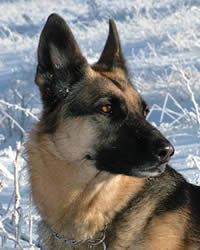German Shepherd Dog Breed Information
 |
| ||||||||||||||||||||||||||||||||||||||||||||||||||||||||||||||||||||||||||||||||
Just The Facts
| Do you own this Dog breed?Please tell us about it in the form at the bottom of this page. Need a good Puppy Name?Visit our German Shepherd dog names page. |
General Description
The German Shepherd is one of the most intelligent of all breeds. It is a large, highly faithful, obedient and devoted dog. It is also one
of the most versatile working dogs.
German Shepherds make good guard dogs, police dogs, show dogs, guide dogs, search and rescue dogs, herding dogs and pets. No wonder it has
remained near the top of the AKC’s list of most popular American dog breeds for so long.
Origin and History
The origin of this breed is credited to Captain Max von Stephanitz.
In the late 1800s he established an organization called Verein fur Deutsche Scharferhunde SV, which was devoted to breeding these dogs. In fact, one cannot find another instance of such a concerted effort to improve dog breeding.
The German Shepherd breed became known for their courage, intelligence, athleticism and working capability. American and British soldiers were
highly impressed with this breed during World War I and brought them home. In 1908, this breed was officially recognized by the AKC.
Temperament
German Shepherd dogs are loyal and highly intelligent. They are always eager to please their owner and will do anything to protect them. They
are independent, courageous, energetic and confident.
Although these dogs are very good with children, you should plan to be present with them if your children are still quite young. This breed is known to get along well with your other pets; however, if you are out and about, it is important to have them on
a leash as they can be aggressive with other dogs.
Care, Grooming, Diet & Exercise
Living Environment – The Shepherd is a family oriented dog and does best when there is constant interaction with family
members. Because they do not like to be left alone for long periods of time, you should avoid this breed if you do not have much time for them.
Grooming – If you have allergies, this breed is not for you because they shed heavily. To properly maintain their double coat they
should be groomed every couple of days.
Diet & Exercise – These working dogs require daily walks and regular runs to stay fit. Plus, their ideal environment would
provide enough room to roam and space to run. Not a dog for lazy people, these dogs are most happy when given constant physical and mental
stimulation.
Health – Like other breeds, this large dog breed is prone to certain diseases such as canine hip dysplasia, epilepsy, flea allergies, eczema,
bloating, digestive problem and blood disorders. Even though they are prone to certain diseases, they can live 12 years or more with proper care,
diet and exercise.
Trainability
The German Shepherd dog breed is known for its high intelligence and dog training is relatively easy, provided they are trained and socialized early.
Proper and effective training includes firmness, fairness and respect, with consistency and adequate rewards.
If you prefer heavy-handed methods,
choose another breed. Positive dog training methods work best (praise and rewards). In fact, choose another pet. Maybe a pet rock.
(You can preview and edit on the next page)
What Other Visitors Have Said
Click below to see contributions from other visitors to this page...
My amazing German Shepard, Casey 




My family wanted a dog for sometime. We had two Dobermen Pinschers for a while and it didn't go too well.
We waited a good (and long) 4 or 5 years and …
My German Shepherd Dog Bella Not rated yet
I have a 2 year old black purebred german shepherd dog and she is gorgeous!!
She is so loyal to me and is always up for a walk, run, game of fetch …
Return to AKC List of Dog Breeds ranked by Popularity
Return from German Shepherd back to List of Dog Breeds page
Visit our Puppy Names page, including Dog Names by Breed
Return to Dogs and Dog Advice home page
German Shepherds have been in my family for four generations. I believe the first ones we had were in the Philippines around 1930’s time. We had Ranger who was black and red, Blacky who was all black, and Lyka who was all white. They protected the chickens and patrolled the properties. They are very loyal and would hike with my family into the mountains. They used to walk my aunties to school and church and wait outside for them when they were children. Great dogs.
I am 31 now and I am on my 7th shepherd (we always had em in pairs of a boy n a girl). My dog’s name is Lucky. I take him running with me almost every day. They don’t need to really go out every single day but I don’t want him to get fat. Fat seems to be the standard for most dog owners. They think fit is skinny when infact, fit is fierce. My oldest brother trained his two shepherds in Schutzhund so I was able to take away from that. Also my dog Lucky was trained by a retired K9 Sheriff in his early training.
That said, GSD’s listen if you are boss. If not, you might as well not own the dog cause they are very obedient. Through training you’ll learn that they are great companion dogs. You’ve got to be careful how you raise them because sometimes you might end up with a bag of nerves. Luckily all of my Shepherds have all been like little heroes; they’ve been very courageous.
Everyone will think your dog is cute as a pup but get scared when they’re bigger haha…